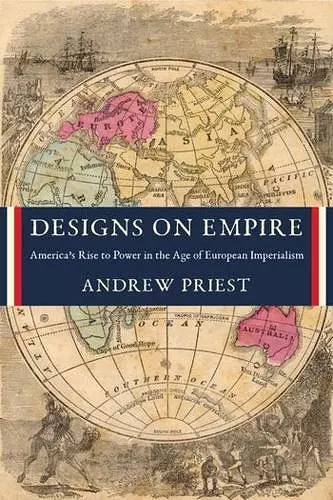Designs on Empire
America's Rise to Power in the Age of European Imperialism
Format:Hardback
Publisher:Columbia University Press
Published:26th Oct '21
Should be back in stock very soon

In the eyes of both contemporaries and historians, the United States became an empire in 1898. By taking possession of Cuba and the Philippines, the nation seemed to have reached a watershed moment in its rise to power—spurring arguments over whether it should be a colonial power at all. However, the questions that emerged in the wake of 1898 built on long-standing and far-reaching debates over America’s place in the world.
Andrew Priest offers a new understanding of the roots of American empire that foregrounds the longer history of perceptions of European powers. He traces the development of American thinking about European imperialism in the years after the Civil War, before the United States embarked on its own overseas colonial projects. Designs on Empire examines responses to Napoleon III’s intervention in Mexico, Spain and the Ten Years’ War in Cuba, Britain’s occupation of Egypt, and the carving up of Africa at the Berlin Conference. Priest shows how observing and interacting with other empires shaped American understandings of the international environment and their own burgeoning power. He highlights ambivalence among American elites regarding empire as well as the prevalence of notions of racial hierarchy. While many deplored the way powerful nations dominated others, others saw imperial projects as the advance of civilization, and even critics often felt a closer affinity with European imperialists than colonized peoples.
A wide-ranging book that blends intellectual, political, and diplomatic history, Designs on Empire sheds new light on the foundations of American power.
Unlike any other book on the matter, Designs on Empire takes a deep dive into American elites’ rhetoric about European empires. Priest forcefully challenges the exceptionalist view that the United States was both nonimperial and uninvolved in European affairs prior to the 1890s and exposes the many ways that the United States was tied up in European power politics throughout the nineteenth century. -- Katherine Unterman, author of Uncle Sam’s Policemen: The Pursuit of Fugitives Across Borders
What did America think of “empire” before it constructed its own overseas empire? By illuminating the often ambivalent views held by Americans of European imperialism in the Reconstruction era, this book offers a novel and welcome contribution to America’s fraught relationship with imperialism. -- Julian Go, author of Patterns of Empire: The British and American Empires, 1688 to the Present
Andrew Priest uncovers the neglected story of how late-nineteenth century U.S. statesmen looked abroad for imperial models, even as they denied the existence of their own empire. Deeply researched, tightly written, and ranging around the world, Designs on Empire reveals that America’s emerging global empire bore the imprint of the imperial formations of the Old World. -- Jay Sexton, author of A Nation Forged by Crisis: A New American History
Fascinating and deeply researched. -- G. John Ikenberry * Foreign Affairs *
Crisply written and cogently argued. * English Historical Review *
Priest’s innovative ideological approach, chronology, and case studies provide a fresh vantage point for exploring the transimperial ties that bound the U.S. Empire with those of Europe. * American Nineteenth Century History *
ISBN: 9780231197441
Dimensions: unknown
Weight: unknown
304 pages